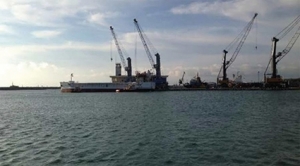Multiplex: Performance of an International Investment Group in Georgia
Multiplex international finance group has been implementing various projects in various sectors of Georgia for many years, including a logistics infrastructure development project designed for countries in the Caucasus and Central Asia.
In his interview with GEORGIA TODAY, Konstantine Mkheidze, member of the company supervisory board, talks about the Multiplex Group.
Which directions does Multiplex focus on and why has the international investment group chosen Georgia in which to do business?
The company, with the full appellation of Multiplex Petrolia Logistics Solutions BV (MPLS), was established in 2013 on the initiative of Levan Kacharava. He has rich experience, operating in the logistics sector since the 1990s, when he became one of the founders of the Silk Road Group. Since then, the holding established in The Netherlands has united several Georgia-based companies and shaped a logistics group to provide container shipping services from the Black Sea ports of Georgia to Central Asian countries. Everybody knows that Georgia’s location is of crucial strategic importance. We simply decided to implement this idea in reality and I think we have achieved our goal. Proposing alternative offers in this field was a precondition for shaping MPLS and we can say with full responsibility that our team has successfully activated the full cycle of international container shipping through Georgia.
What is the objective of your company?
Our objective is to provide delivery services to Georgia and the Central Asia region, shape infrastructure for shipping cargoes from these regions to the west and provide due services. There is high demand for supply services in Central Asian countries. Specifically, this region is populated by about 60 million individuals. They are dynamically developing and demographically growing countries. Organizing a supply chain for these regions, provision of cheap services, ensuring high technological capacity of the process, transparency and efficiency create grounds for growing the competitive capacity of MPLS.
Before the establishment of Multiplex Petrolia Logistics Solutions BV, supply of Central Asian region countries and exports of products created in these countries was carried out via other shipping methods. However, the level of services, operative shipping and the supply timeframes could not satisfy the existing demands. In that period, container shipping was not carried out in this direction, while today container shipping represents an important segment in international cargo turnover. We have managed to shape a full cycle of logistics business.
In which specific directions does Multiplex offer competition?
MPLS has combined several businesses into a single cycle: container cargo reception and processing, storing in specialized refrigerator complexes, registration of cargo and transportation. The so-called North route for supply of Central Asia, from Klaipeda and St. Petersburg seaports, has shaped the alternative supply chain. Moreover, through Georgia we ensure fast supply services for Central Asian countries from South and North America. The company ship operates for cargo transportation in the Caspian Sea zone and we have good experience of working on non-military cargoes for Afghanistan.
I believe this is not only innovative and an interesting direction for business, but also makes a real and profitable business for Central Asian countries and Georgia. All these factors stress that MPLS has earned itself a lot of confidence on the international market.
Which companies does Multiplex Group unite?
The MPLS BV Group unites several companies, including American Monolith with a 10,000-ton refrigerator complex in Poti, Arco with a 4,500-ton refrigerator complex in Tbilisi, Hasting Enterprise with transport infrastructure, which also manages the Hovsan private seaport in Baku, and RFG company implementing cargo logistics.
We ensure a perfect technologically valuable production process. The mentioned companies ensure the thorough cycle of this business. We finished construction of the Poti refrigerator complex in 2011 and reconstruction-reequipping of the Tbilisi refrigerator complex in 2014. Poti works on transit cargoes, while Tbilisi is oriented on domestic market demands. At this stage, both complexes fully meet modern standards in terms of quality control and cargo registration.
By Mariam Surmanidze











